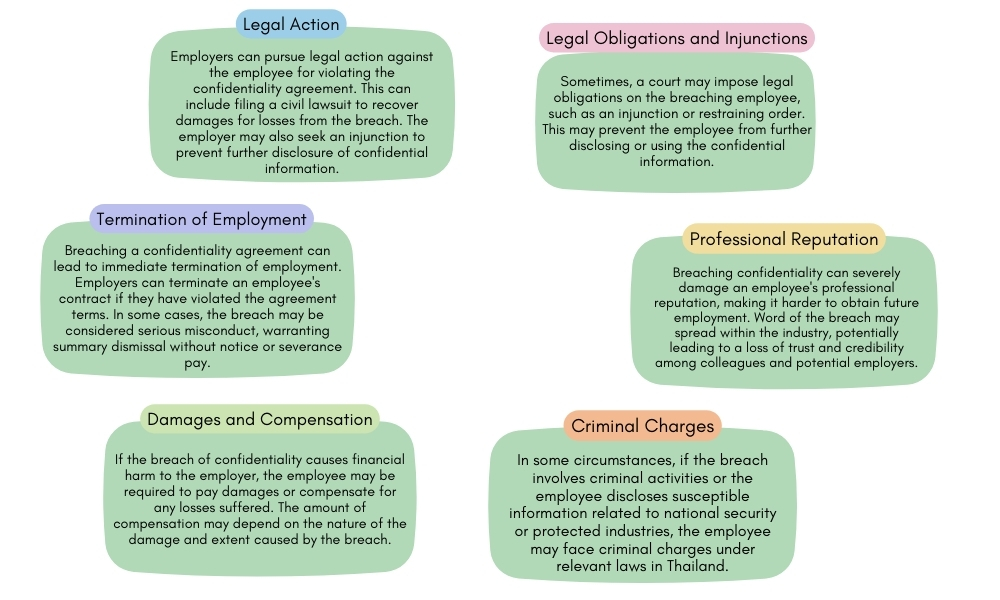Call us now:

The breach of employee confidentiality in Thailand
Confidentiality is vital for a conducive working environment as it protects sensitive information. Employee confidentiality in Thailand goes a long way to making employees feel safe; however, the recent happenings have rocked corporate Thailand to the core. The exposure of breach of worker confidential rights has left many questioning the credibility of data protection measures as well as the privacy levels companies have.
Table of Contents
What is employee confidentiality ?
Employee confidentiality in Thailand describes the legal and ethical responsibility of an employer to keep their employees’ privacy and sensitive information confidential. It includes all the concepts of privacy and confidentiality, whether election-related, including personal data, employment agreements, salary information, medical files, disciplinary records, and other sensitive information obtained during employment. It underscores the importance of confidentiality in fostering trust between employees and the employer, maintaining privacy rights and a safe work environment.
Thai employee confidentiality rules are lawful under Thai labor law, where loss of privacy is protected by the Thai Labor Supervision Act and other pieces of legislation such as the Personal Data Protection Act in Thailand. . Such decrees require companies to establish appropriate controls to prevent unauthorized disclosure, unauthorized use, or unauthorized access to employee information. Therefore, employers have the responsibility to establish operational procedures to manage employee information confidentially and ensure that data will not be used in a manner that would involve the employees’ privilege to reduce their own privacy.
Organizations should prioritize security and privacy by providing rigorous guidelines, confidential individual training to restrict confidentiality, and confidentiality meetings to make and repercussions that implement employee trust conditions.
Free
consultation
What law applies ?
The law that applies to employee confidentiality and its breach in Thailand is regulated by the Civil and Commercial Code and additional statutes and regulations. Legal considerations are the following:
- Civil and Commercial Code : Thailand’s Civil and Commercial Code encompasses provisions regarding contracts and obligations. It is the regulator that underpins the legality of employee confidentiality in thailand and provides the general contract law and principles with respect to the negotiation, formation, performance, interpretation, and termination of agreements.
- Trade Secrets Act : Trade Secrets Act of Thailand focuses on the protective measures that regarding trade secrets and confidential information. The act introduces the judicial remedies for the misappropriation, usage, or disclosure of the trade secrets and claims liability through civil and criminal actions.
- Intellectual Property Laws : The Copyright Act, The Trademark Act, and the Patent Act may be applied if the confidential information is intellectual and copyright-protected. These statutes address intellectual property rights and provide additional layers of liability and subject ably enforced.
- Personal Data Protection : The Thai Personal Data Protection Act may also apply if the confidential information comprises personal records. The act governs the collection, process, disclosure, and other actions regarding the personal data and obliges businesses to securely handle personal records.
What are the consequences when an employee breaches his confidentiality agreement ?
Why is signing a confidentiality agreement essential ?
It is essential to sign an agreement on confidentiality when doing business in Thailand for several reasons:
- Employee Obligations : Such agreements stipulate the duties of employees of the company or organization that signed the document. By signing a confidentiality agreement, the employee must agree to keep the trade secret and any information they receive confidential. The purpose is to prevent an employee from disclosing sensitive and classified information they have learned, including technological innovations, marketing, client lists, and other information.
- Protection of the Interests of the Company or Organization : A confidentiality agreement is a tool to ensure the permanent confidentiality of any information considered essential to maintaining the competitive edge of the company or organization. This is especially true today when the private sector is massive, and many organizations in the same area compete with each other. If an employee gives significant parameters about the technology or customer base of their company to a competing organization, they will be able to get ahead without making as much effort. It can put the company or organization at risk of losing its already established business.
- Legal Provisions : The act of signing a confidentiality agreement on the part of Thailand’s employees obliges them to comply with the legal requirements of the country, such as adherence to the Trade Secrets Act in Thailand. This act contains legal provisions that do not allow sensitive company information to be disclosed.
- Avenues for Taking Action : In cases where a memorandum of understanding is signed, an important technology, sales market, and trade secret is disclosed, employees understand that it is possible for the company or organization to take legal action in the event of a leak or disclosure in relation to the signed memorandum of understanding
It is significant to note that confidentiality agreements may be customized to suit the particular needs and requirements of the parties involved. Consulting with a lawyer for employment is advisable to ensure that the agreement adequately protects the parties’ interests and complies with applicable laws in Thailand.

